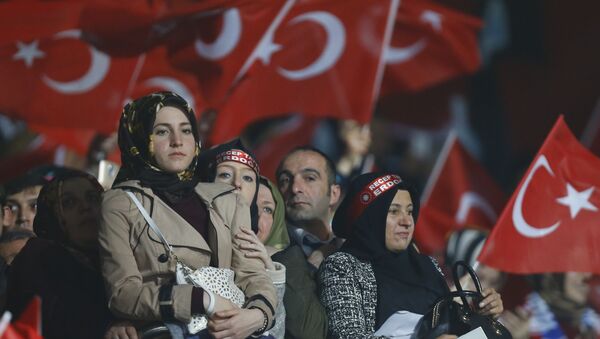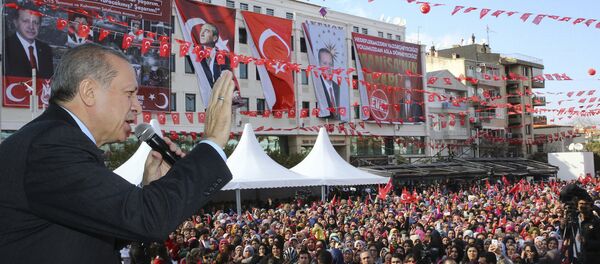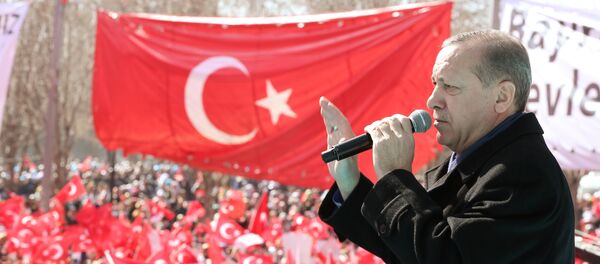The Commission, which advises the Council of Europe, said the constitutional reforms which await public ratification in an April 16 referendum would place the country "on the road to an autocracy."
It is not the first time the democratic situation in Turkey has been criticized by a major human rights organization in the wake of the abortive July 2016 coup. In January, Human Rights Watch said the dismissal, arrest and incarceration of "thousands" in its wake had plunged the country "into its worst crisis in a generation."
Turkey: Alarming Deterioration of Rights | Coup Attempt No Justification for Crackdown on Peaceful Critics https://t.co/s5FulabREL #WR2017 pic.twitter.com/zfoRcb15cM
— Human Rights Watch (@hrw) January 13, 2017
Opposition parties have voiced concern that centralizing power in the Presidency will stifle debate and multi-party politics in the country, mutating the country into an effective one-man dictatorship. Leading Turkish journalist Ilhan Tanir agrees with this analysis.
"The referendum is an opportunity to vote for a 'one-man show' or a parliamentary system. The Turkish parliamentary system is by no definition is a great system — there are many problems I could talk about for hours. However, there's still a separation of powers — the referendum will remove oversight if it passes, which is why the vote is so significant for country's future," Mr. Tanir told Sputnik.
Mr. Tanir is also certain the referendum will not meet international standards. It remains uncertain whether international observers will be allowed to monitor the referendum, although even if they are, he doesn't expert the international community to punish any wrongdoing. He'd like to see the West "speak up more" — especially as Turkey is a NATO member, and apparent European Union partner.
"One thing Turkey was able from the 1950s until recently was hold free and fair elections. In the past few years, there's been nothing free or fair about votes in the country. Erdogan has used all state resources to ensure he wins," he explained.
"Since the coup failed, the government has used extraordinary decrees to shut down hundreds of media organizations which broadcast or published anything critical — almost 90 percent of critical organizations have been shut down, and it's now almost impossible for critical journalists to work in Turkey, much less live there."
What accounts for the failure of the West to take a tough line on Turkey? Mehmet Koksal, Project Officer at the European Federation of Journalists, believes it's attributable to the country's refugee deal, the only successful migrant-stemming operation the EU has been able to establish — attempts to replicate it in Libya and Morocco have failed. As a result, leaders are "shy" about raising their voices on "blatant violations" of freedom of speech and the press.
"There is a good, functioning tool for dealing with Turkish conduct, which was employed by Russian President Vladimir Putin — placing pressure on Turkey's activities in respect of arms trafficking and economic deals. This economic message is very effective — the business community hates it," Mr. Koksal told Sputnik.
Alternatively, he added, European leaders could ban Erdogan from visiting. The Turkish President is planning to visit EU countries in support of the referendum — preventing him from entering their countries unless he immediately releases hundreds of journalists currently in jail is a "basic, practical step."
In particular, Mr. Koksal notes, it's "almost impossible" for reporters to cover events in the Kurdish region of Turkey — "they are almost immediately deported and harassed."
He adds international media outlets are considering relocating their Middle East operations from Turkey to elsewhere in the region because of the crackdown. Given the rhetoric employed by Erdogan, he doubts we'll see an alleviation of the tactics being used on journalists any time soon.
"Erdogan has almost complete control over the media, including the internet and television. What more power can he seek? A crackdown on the military is understandable given their role in the coup, the attacks on journalists and civil servants is not. They were not on the streets trying to topple the government with arms. They were merely doing their jobs. A state of emergency doesn't give a government the right to ignore human rights. The Council of Europe has repeatedly reminded Turkish authorities to respect human rights," Mr. Koksal concluded.




